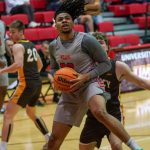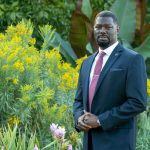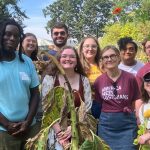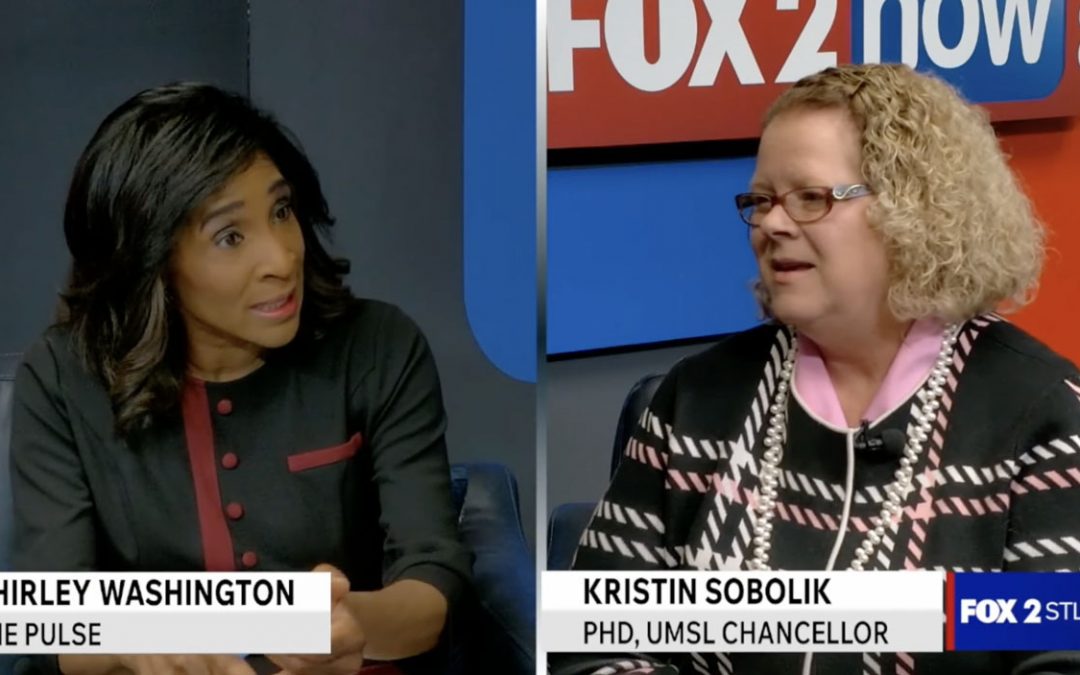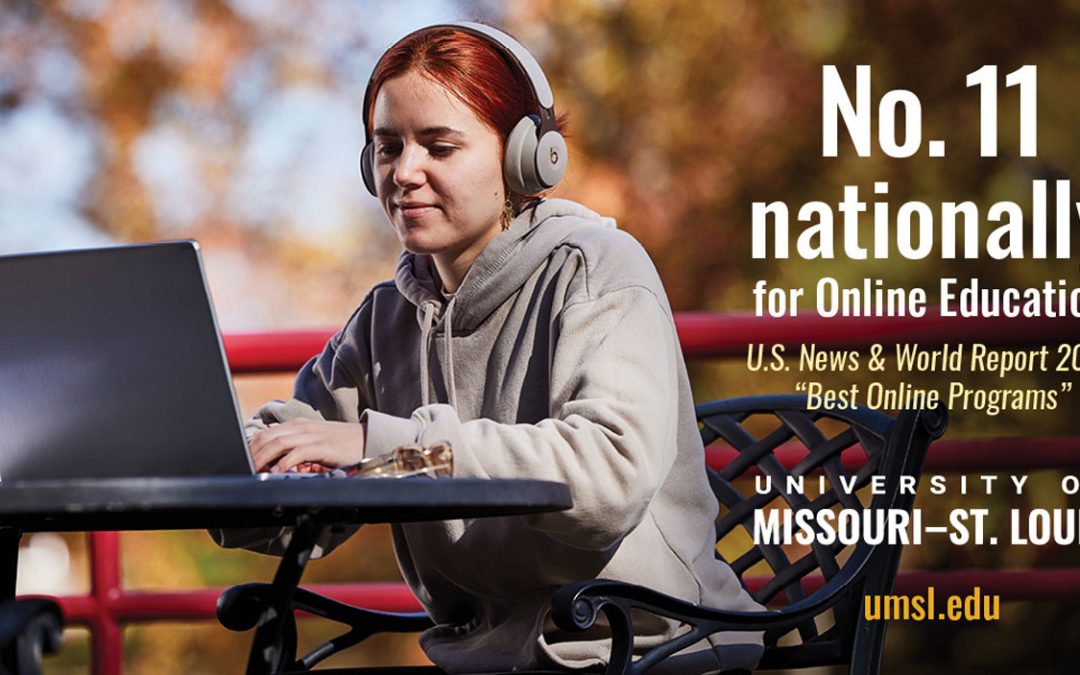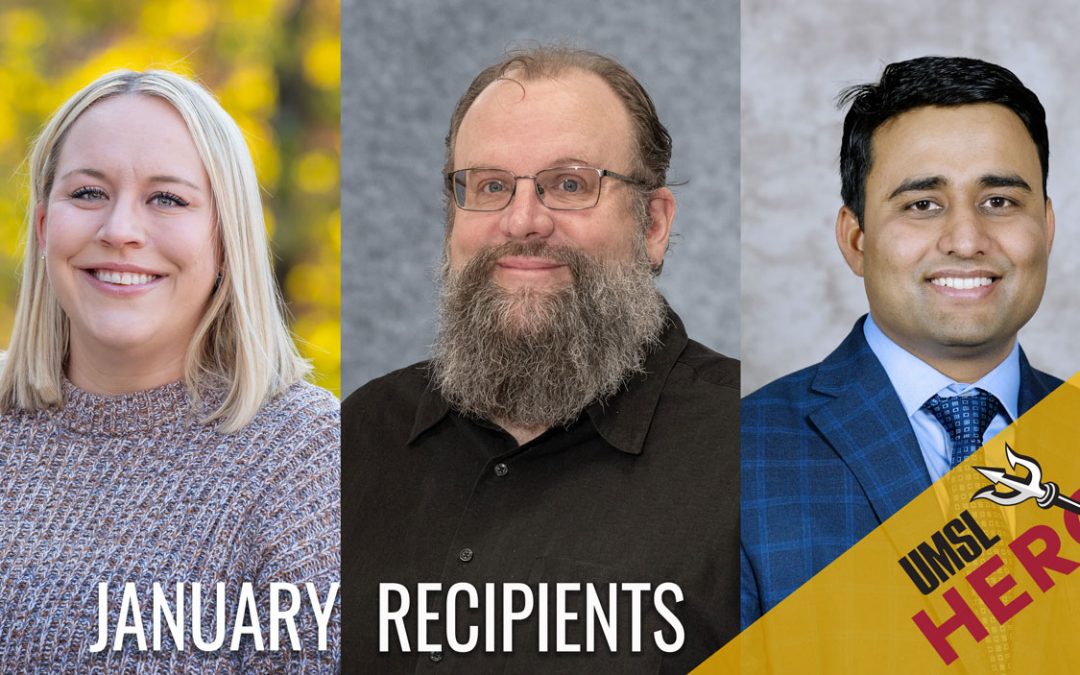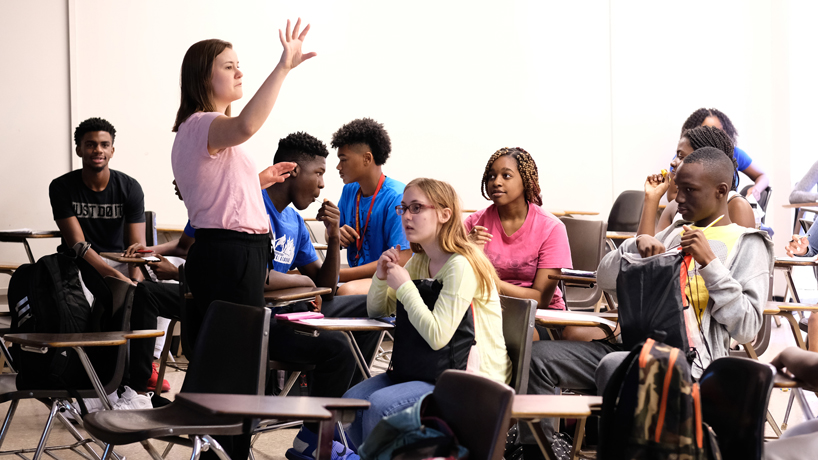
Mathematics Instructor Emily Knight delivers an interactive lesson to St. Louis area high schoolers during the final week of the UMSL Bridge Program Summer Academy. During the four-week program, students take math, science, intensive writing, and career and personal development courses. (Photo by August Jennewein)
Nia Sumpter was sitting in a University of Missouri–St. Louis office when she had an epiphany.
She could let a medical diagnosis she received as a child limit her potential, or she could use the knowledge she had gained as a patient to guide her future.
“It is not by happenstance that what I once thought was my battle has now manifested into pursuing an academic career advocating for others like me,” Sumpter told a crowd of about 600 attending Friday’s UMSL Bridge Program Summer Academy Closing Ceremony. “I have acknowledged and accepted that I must face my fears and fill in the blanks for myself, take the chance and believe in myself.”
Sumpter was a high school student in the UMSL’s pre-collegiate Bridge Program when she made the realization that would shape her career.
In the years since, she’s gone on to graduate from Hazelwood Central High School and Saint Louis University, earn a spot in the Johns Hopkins School of Medicine Summer Institute in Anatomy and pursue a career as a pediatric cardiothoracic surgeon.
Her success story doesn’t stand alone among Bridge Program alumni.
Since 2003, 100 percent of Bridge participants have matriculated into college. A new group of nearly 300 soon-to-be high school sophomores and juniors hope to continue that trend.
For the last four weeks, high school students from around the St. Louis region have spent their weekday mornings as participants in the UMSL Bridge Program Summer Academy. Through the annual offering, students participate in intensive math, science, writing and career-planning courses.
Tied within these classes are workshops and curriculum designed to minimize gaps that inhibit students from transitioning to college.
“We’re providing resources to decrease many common barriers that some students find difficult to navigate or overcome,” said Natissia Small, assistant dean of students and director of academic affairs. “The Bridge Program is built on creating avenues for making the college transition process seamless. Bridge is committed to providing access to resources that can equip families with knowledge that will undoubtedly benefit their students’ pursuit of higher education.”
ACT preparation, conversations with area career leaders and lessons on finding colleges that match students’ academic and financial situations are all part of the monthlong process.
“Most of the things we learned, I had never seen before, which I loved,” said Taycee Albritton, a Summer Academy participant and sophomore at McCluer High School. “It was a good challenge for me. I feel very prepared for the coming school year. There is not one thing that I learned in this program that won’t benefit me in my future.”
Part of her preparation came through the academy’s career and personal development course.
An assignment pushed Albritton to chart out her professional and life goals. She’s long aspired to be a veterinarian, so for a final project, she began researching Midwest-based institutions. The search guided her to her ideal pre-veterinary program.
“My life decisions were made with that dream in mind, which is why I was so happy when I was accepted to participate in the Bridge Program,” Albritton said. “The Bridge Program doesn’t just focus on our academic enrichment, but on our overall development as students.”
On a given morning, students could jump from a dissection lab to a creative writing prompt before undergoing a mock job interview.
Students would giggle and joke in typical 15-year-old fashion as they transitioned from one 55-minute course to the next. But they quickly switched to a more serious demeanor when one of the 11 instructors called the class to attention.
“As students in the Summer Academy, all of the instructors and staff have challenged us to be our very best on a daily basis,” St. Mary’s High School student Joshua Beck said. “This summer, we were provided with opportunities that will further develop our leadership skills as we prepare ourselves to be groundbreakers and change agents that will impact this world.”
In conjunction with the Summer Academy, the Bridge Program serves more than 4,000 families annually. Additional opportunities include the Express Scripts Saturday Academy, which is hosted on the first and second Saturdays of each month from October to March, the Parent Academy, after-school clubs and a variety of workshops throughout the academic year.
“The Bridge Program is an example of the university’s commitment to the many families in the St. Louis community,” Small said. “The services, support and resources we provide are unique and strategically designed to make college matriculation, persistence and degree attainment a possibility for a lot of students in the St. Louis region.”
Small and her team have purposefully designed the Bridge initiatives to be academically challenging, which she hopes will help participants realize their full potential.
Sumpter reminded students of that in her keynote address.
“Just think, my motivation all started because I identified an obstacle to overcome and a simple dream,” Sumpter said. “Everybody has a dream, but not everybody has the courage to conquer the fears that hold them back from obtaining their dreams.”







